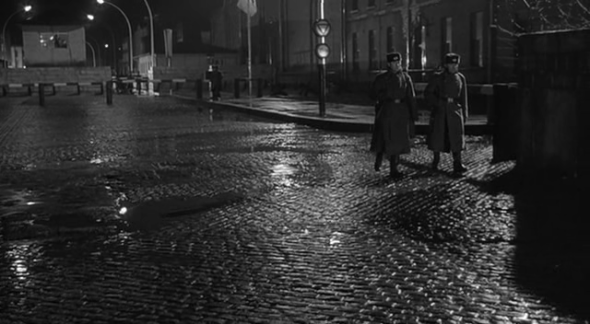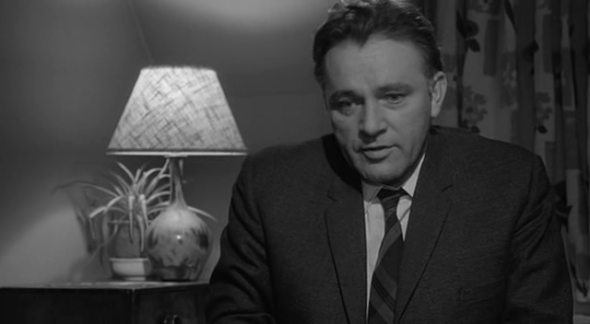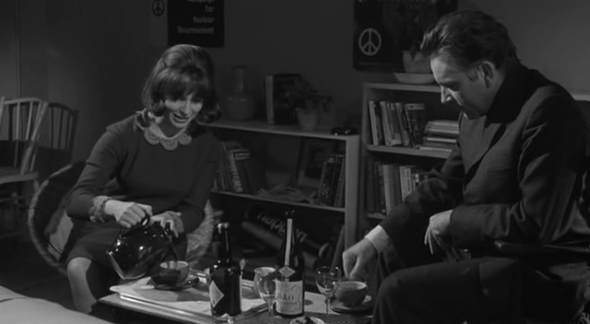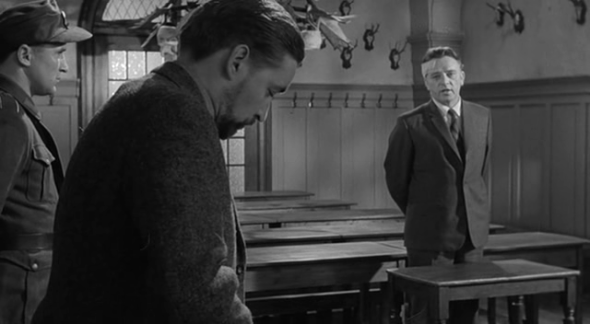Tinker, Tailor, Soldier, Spy
The new movie adaptation of veteran spy novelist John le Carre‘s Tinker, Tailor, Soldier, Spy feels a bit quiet but that wouldn’t be a surprise because of its director, Tomas Alfredson, who made a vampire movie look sanitized. Although instead of snow and tiles painted with blood, he brings the same craftsmanship to London and Istanbul circa 1973. Unlike the more casual 1979 BBC miniseries, Alfredson and crew have the burden of making the movie feel distant from contemporary times. Old wooden furniture, soot-stained marble and stone buildings, MI-6 employees wearing sepia tone double-breasted vests, typing on dull green computer prototypes. I have a few issues with the tone, like the soundtrack in the beginning and the shadows on the actors faces but nonetheless, its’ an exercise in style in the best of ways, the formalism appealing because everything’s so toned and filed down, like a dull but blunt object.
Control (John Hurt) sends Jim Prideaux (Mark Strong) down to Budapest to get a codename of a mole who has been in the MI6 – nicknamed ‘The Circus’ – for years. The set-up goes awry and Jim dies. To redeem themselves from national embarrassment, Cabinet Secretary Sir Oliver Lacon (Simon McBurney) enlists someone from the ‘outside,’ cuckolded and ousted agent George Smiley (Gary Oldman) to pick up where Jim has left off. George differs in his approach to the matter, he’s not trying to lure some field agent overseas. Instead he looks within the agency, its paperwork and interviews of ex-employees, convinced that the double agent would try, and fail to cover his tracks at home.
This movie is the epitome of boy’s club but in the best of ways, as the story lets us into the group’s fracking façade. The infighting, as these middle-aged Received Pronunciation speakers bellow about how authentic each other’s stolen information are and the sources from which these files are produced. They end up accusing each other of being too old, too much of a wild card or too paranoid, leading to some dismissals from the agency. The next step, of course, is for Smiley and other agents to spy on each other. One of the circus’ mostly deluded yet loyal members is a woman, Connie Sachs (Kathy Burke). When Smiley ends her interview, she waves, saying along the lines of ‘If it’s bad, don’t come back to let me know.’
Loyalty is the biggest conundrum here. It lacks the showy-er elements of contemporary spy movies which is a deterrent for some audiences. However, the MI-6 of the 1970’s doesn’t need muscular action against its enemies and neither do their battles involve a weapon that can kill them all. They live in a world where agents cross the Cold War’s already fluid lines. This betrayal is sickening and perplexing enough to these characters although thankfully, George and his rogue allies are jaded enough not to fight while brandishing Connie’s blind patriotism.
I’m on the fence here – the more time elapses between that surprisingly exhilarating last shot makes everything else seem more like a passing flavour. Like an experience that immerse its audience then just as gradually lets them go. A few things stay with me, like Tom Hardy’s performance as footman Ricky Tarr, that burly man reintroducing himself and his voice as a wounded stray. Or Colin Firth’s modest expressions as Bill Haydon. The zoom-outs between two pillars as dread-inducing jet fighters fly through European skies and another one from Control hearing about Jim’s death. And the slow motion sequence in the conference room with Control’s suspects, Tinker – Percy Alleline (Toby Jones), Tailor – Haydon, Soldier – Bland (Ciaran Hinds) and Poorman – Esterhase (David Dencik). The pipe smoke lifting from their faces, their eyes mockingly looking at George the Spy, Control’s oblivious fifth suspect. Good movies are one that twists the mind.
The Spy Who Came In…
Adapted from the John le Carre novel of the same name, the first five minutes of Martin Ritt‘s The Spy Who Came in from the Cold will convince us that it’s not like any other ‘caper’ spy films, giving us melancholy piano and woodwind music hovering above the barbed Berlin Wall in the mid 60’s. Protagonist Alec Leamas (Richard Burton), an agent does a lot of waiting, needing coffee to stay up watching the border. The film lets us watch Alec and lets us into his head, only hearing his footsteps in the night. His conversations with soldiers aren’t racked up with tense music. In a few seconds, an Allied spy gets shot while trying to bike across the border. We see Alec for a half second as he watches his colleague die, but the film won’t let us see his eyes well up or glimmer in anger and vengeance.
Like any spy, Alec embarks on some method acting. Control pulls him away from Berlin back into London, is assigned to act like an alcoholic delinquent – I can hear some of you snarking that that’s not a stretch for Burton, but hold on. The goal is to make the Socialist agents in London think that he wants to defect, and he then plants false information that would implicate the higher powers of East Berlin to destroy each other. While working at a library that no one suspiciously visits, Alec meets a Communist woman named Nan Perry (Claire Bloom) and he grows fond of someone whose belief system is the target of his operation. I liked watching him challenge her. It shocked me to see an atheist character given a sympathetic, nuanced light in 1965, imagining that her character would be portrayed in a radically different way had this been a more American production.
The film also lets us into the more mundane parts of espionage life, letting us into tedious, unglamorous instructions by a head librarian which is subtly funny. Or detailed conversations between agents and double agents, Alec’s lies are a hazy prop compared to what’s really happening. He maneuvers his way within characters who refreshingly don’t look like movie stars.
I’m not sure if it’s the hair and make-up department who does the wonders here, but Oskar Werner, who plays Alec’s target Fiedler, has such a confident presence in the film compared to his wimpier turns in his collaborations with Francois Truffaut like Jules et Jim and Fahrenheit 451. he’s masculine yet subtle, commanding even for someone heading to a trap. Burton isn’t perfect in this movie. He can’t punch, and his last soliloquy in the end relies of his staccato delivery that might as well be his crutch. Other than that, this is his most subtle which makes it his career best in his movies that I’ve seen. It’s in his quietest moments when we can see him in his most vulnerable place, conveying the most emotion while just sitting there listening to another person. He deserves that Oscar nomination, showing us the human side of secret agents.






